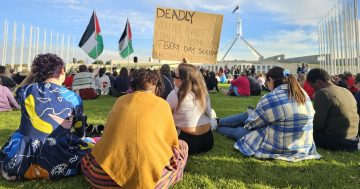
ANU research is showing that surviving domestic violence involves multiple strategies to stay safe. Image: File.
Canberra women are being asked to contribute to new research at the ANU examining the strategies they use to keep safe and avoid violence in their relationships.
The study comes as a second enquiry into the family law system in Australia has been questioned by many in the sector. Critics say that extensive consultation into family law and violence-related matters has not resolved many of the issues that continue to damage families and relationships.
PhD researcher Hayley Boxall from the ANU Centre for Social Research and Methods says the study specifically targets women’s experiences. A diverse range of women have already shared their stories and the results challenge popular misconceptions about who experiences domestic violence in Australia and how they respond.
Common strategies include avoiding triggers, threatening to leave or end the relationship, and talking to their partner about the impact of the violence on them and their families. Some of the women have also asked for support from their own or their partner’s family, asked the partner to seek counselling and have tried to be the “perfect partner”.
“Many of the women coming forward have been victims of coercive control, threatening behaviour, gas-lighting, property damage, physical and sexual violence,” Ms Boxhall said. She observes it is only in hindsight that many of the women experiencing coercive control, in particular, are able to understand how the dynamic works and how damaging it can be.
“We are so good at identifying physical risk but emotional risk is more difficult to comprehend.”
The research is being conducted by self-nominated face-to-face confidential interviews. The only criteria to participate in the research is that women must be 18 years or older and have not experienced violence in the past six months. This includes relationships that are ongoing or that have ended.
The study suggests domestic violence affects women from all walks of life. Ms Boxall said there’s a common perception that domestic violence victims may come from vulnerable backgrounds. But many of the women to whom she spoke were well educated and had professional backgrounds.
“It isn’t really the demographic we think of when we think of domestic violence victims,” Ms Boxall said.
“We tend to view women who experience domestic violence as very passive and beaten down, but these women are not. They have resources and they use them to negotiate their risk.”
Ms Boxall says she hopes the research will change narratives about domestic violence survivors, and help with safety planning processes.
For further information on the study, including becoming a participant, click here.




















